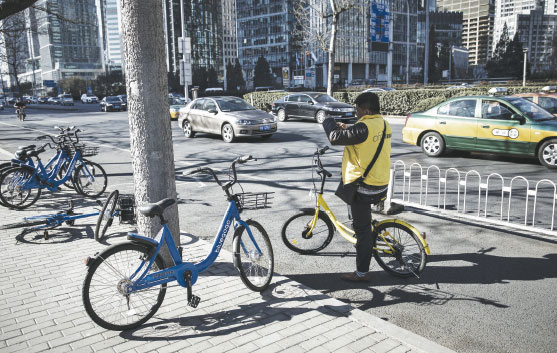Tech behemoths fuel bike-sharing war
|
An employee of Ofo Inc, a bike-sharing company, takes pictures of parked Bluegogo bikes in downtown Beijing. The proliferation of bike-sharing in the country has fuelled a new round of cash-guzzling competition. With newcomers joining in the fray, most market players are fighting over services at low charges without any "blood-making" business strategies. Shen Qilai / Bloomberg |
Winning formula remains to be seen with titans raising stakes
The sharing economy is taking on new significance on the Chinese mainland with fledgling bike-sharing operators going for each other's throat.
Brightly-colored shared bikes have inundated major cities across the country, putting urban dwellers back on the two wheelers and restoring the land's fame as the "kingdom of bicycles".
Deep-pocketed venture capitalists have raised the stakes, propping up bike-sharing startups wrestling for market share in scenes reminiscent of the money-burning war in the nation's ride-hailing arena.
Ofo - one of the mainland's top two bike-sharing apps - raised $450 million in March this year - the biggest ever funding round in such a high-flying sector. Some 15 investors have so far sunk $650 million via eight funding rounds into the barely three-year-old startup, making it the world's "most valued bike-sharing unicorn".
Arch rival Mobike is catching up, raking in more than $300 million from two funding rounds this year alone.
The two market leaders have raised a combined 8 billion yuan ($1.16 billion) as of April this year, accounting for 85 percent of the investment in the country's burgeoning bike-sharing industry, according to business and technology information provider TMTpost.
The investment bonanza escalates as e-commerce behemoths Alibaba and Tencent take sides in the bike-sharing tussle.
Ofo has raised an undisclosed amount in its Series D+ funding from Alibaba's financial arm Ant Financial, while Mobike has struck a deal with Tencent to bring bike-sharing to WeChat's roughly 900 million monthly active users in the country after Tencent led the company's $215-million funding round earlier this year.
"Bullish venture capitalists have funded the rapid expansion, ensuring that the ambitious startups fight the bruising battle without caring too much about costs and profitability," said Jacob Zhou, an analyst at one of the Big Four accounting firms.
Yet, concern about whether such an investment spree makes economic sense continues to mount, with those within the industry itself questioning the sustainability of the growth model.
An Ofo employee, who asked to remain anonymous, said she was rather shocked by the speed at which the company is beefing up its presence at home and overseas.
Although founded less than three years ago, Ofo has expanded its headcount to roughly 1,000, most of whom are in their 20s and are fresh graduates without any work experience.
Soon after joining Ofo last year, the employee was transferred to the United States to pave the way for Ofo making inroads into that country. At that time, however, her team had no clue as to how Ofo's biking-sharing business model may fit in with the US market.
"Basically, what's going on with Ofo is a 'land-grab' story. This may be the way for a young and aggressive company to survive and thrive," she said. "But, the question is how long we can expect to 'take cities and seize territories' by burning money? It just made me feel we're branching out with an unlimited budget in the belief we may fetch a fairly good price by selling the company even in the worst-case scenario."
As a former venture capital analyst hunting for upcoming players in the mainland's startup boom, she eventually quit her job and joined Ofo, "simply not because my new employer proves to be an uprising star but because it lured me away with a pay offer I can hardly reject".
According to the China Bicycle Association, the nation's craze for bike-sharing has put more than 2 million of the two wheelers on the streets, and the figure is projected to hit 20 million this year.
The sector-wide insatiable demand for sharing bikes is expected to go beyond 30 million, testing the industry's production capacity that has long hovered around 25 million.
With dozens of newcomers muscling in on the bike-sharing market, buying more bikes to occupy the streets is far from enough to vie for riders. Rival startups are in a rush offering a wide range of incentives, including more frequent free-ride periods, and more lucrative cash gifts, all of which is tantamount to burning cash.
At the bottom, startups are fighting over services that cost riders only 0.5 to 1 yuan for a 30-minute ride on payment of a small deposit.
In the sea of yellow, orange, blue and green sharing bikes, a brand new lifestyle has shaped up on the mainland. The number of domestic riders is projected to grow by 646.4 percent on year to 209 million in 2017, with the market size surging by 735.8 percent to 10.28 billion yuan, says a report from research and consulting company iResearch.
"Basically, the industry is hooked on expansion today, with rival startups replicating the story of the car-hailing business in which small market players were eventually knocked out of the game amid a cash-guzzling competition, and only a few big ones managed to dominate the market, cementing their positions as rule makers and standard-setters," said Fielding Chen Shiyuan, Hong Kong-based Asia economist at Bloomberg Intelligence.
Big-spending venture capitalists are injecting a steady flow of funds into the sector to underpin the ongoing bike-sharing boom, but the "blood-making" capacity of the bike-sharing industry still remains to be seen, said Chen.
Newcomers continue to be seen joining in the fray. The latest startup that has just closed a 10 million yuan angel funding round debuted this month with its rainbow-colored sharing-bikes and LED light wheels.
"The bike-sharing boom, putting China on course to restore the title as the 'kingdom of bicycles', stands as the latest poster child of the sharing economy. What matters is will and how will such a headline-making business model inject new vitality into the national economy. The answer lies in the market test and over time," Chen said.
sophia@chinadailyhk.com










